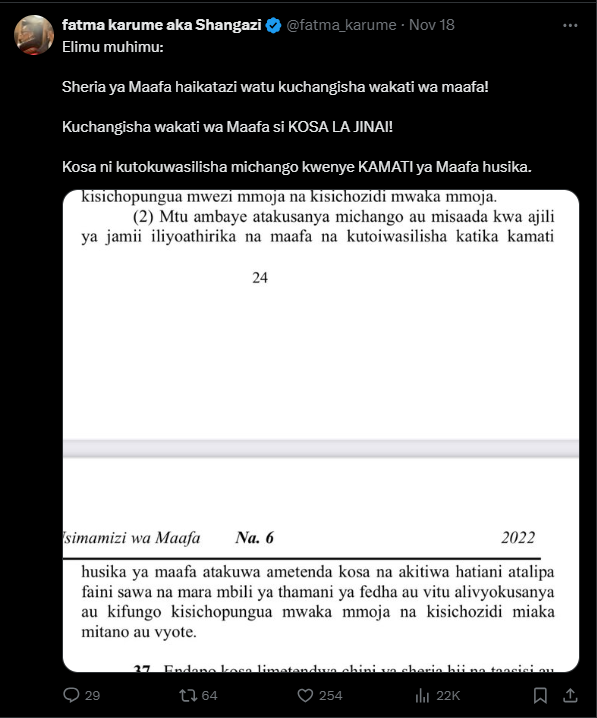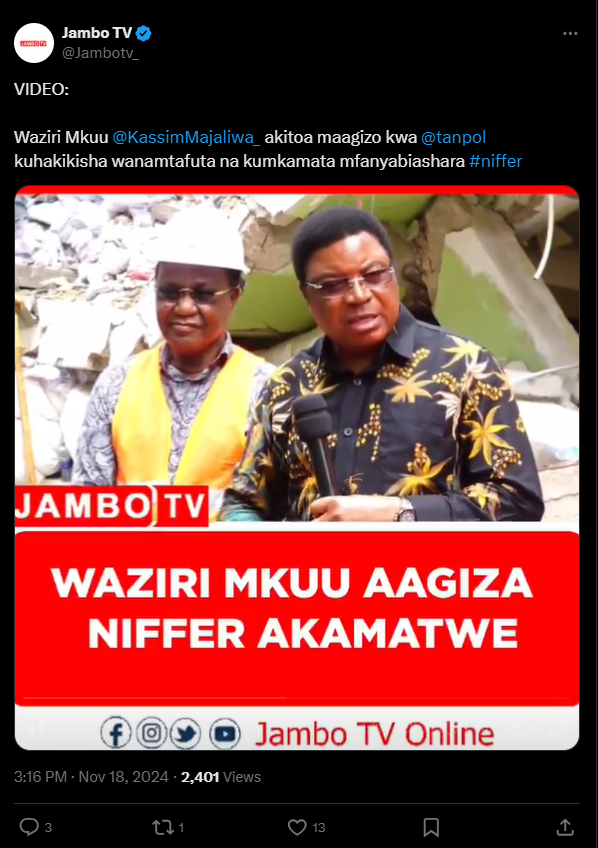A storm is brewing on social media after Jennifer Jovin, known online as Niffer, revealed that she had raised millions of shillings for victims of the Kariakoo building collapse.
The Prime Minister, Kassim Majaliwa, has ordered her arrest for soliciting funds without government authorization, igniting a heated debate over the legality of such initiatives.
While some see this as a crackdown on free speech and charitable efforts, others question whether the government is overstepping its bounds by interfering with private fundraising activities.
This article explores the legal and ethical dimensions of the situation, asking whether Niffer’s actions are a violation of the law or a legitimate expression of public goodwill.
Shangazi wa Taifa (aka Fatma Karume), a renowned advocate of the High Court, lamented on her X page that no criminal law prohibited individuals from collecting money for a specific cause.
Examples include victims of accidents, natural disasters, weddings, tuition shortfalls, and deaths, just to name a few. So, with that in mind, the question has to be: Did the premier overstep his mandate and legislate a criminal law against “Harambee”?
This discourse attempts to scope all these legal dilemmas and consider whether an attack on Niffer was an attack on freedom of speech and expression.
Prime Minister Kassim Majaliwa has ordered the arrest of a media sensational, Niffer, for soliciting funds for the collapse of the Kariakoo building.
Niffer, in her Instagram account, was transparent and recounted the frustration of constraints imposed by sim card operators to receive a huge chunk of money.
She discerned that her account had a limit of Tshs 9 million, while the Good Samaritans had contributed more than that. Other contributors were urged to remit their money into her “LIPA NAMBA.”
Niffer reassured her tens of thousands of loyal followers that the money had already been sent to buy whatever was needed to assist the government in the rescue mission.
However, she did not mention who received the money or how credible that person was to deliver as she had promised. That will later become a matter of contention for the contributors but not the government.
Harambee is unknown to us. We organize ourselves for various things, from personal to public effects.
We have even business people who build police stations or schools or provide ambulances, but nobody, let alone the premier, has questioned those philanthropic gestures.
Some people organize Harambee, from weddings to anointing during Eucharistic celebrations to school fees. Do we need anybody’s permission to mobilize ourselves for causes dear to us?
Do we have to seek a permit to collect money for a family member recuperating in a hospital bed? The basic question is whether we need the government to direct us on how to spend our money.
There are no laws that Premier Majaliwa used to order Niffer’s arrest for soliciting over Tshs 30 million to aid those affected by the multistorey building collapse.
Even if such laws were created, they would infringe on constitutional freedoms of expression and speech. In Citizens United v. Federal Election Commission, 558 U.S. 310 (2010), the US Supreme Court ruled that superpacks that solicit money to fund election campaigns are protected under constitutional freedom of speech and expression rights.
Section 36 (2) of the “Maafa ya kitaifa“ doesn’t recognize having a permit to collect money is a criminal offence, but failing to surrender it to “Kamati ya maafa ya kitaifa“.
The question needs further investigation: Do man-made accidents qualify as great disasters? Disasters happen when we have no control, but this one was not a great natural disaster to fall under this law.
The court held 5–4 that the First Amendment’s freedom of speech clause prohibits the government from restricting independent expenditures for political campaigns by corporations, including for-profits, nonprofit organizations, labour unions, and other kinds of associations.
The Tanzanian constitution protects the rights of freedom of speech, expression, and association. Niffer only exercised those rights, and the government could not curtail them.
Has Niffer violated the Vicoba law? The answer is negativity.
Vicoba is an organized effort within a hierarchical chain of command buttressed by constitutional order. Individual efforts are freed from bureaucratic inertia.
Individual initiatives can quicken decision-making and reach the victims much faster. The drawback of individual initiatives is a lack of accountability, but efficiency and effectiveness can override preferences.
Why is the Government Miffing?
The real reason the government is miffing over Niffer and others supplementing government efforts is an apprehension of a government losing trust.
As more individuals decide to seek solutions outside the government’s orbit, the relevance of that government diminishes.
In that light, I can appreciate Premier Majaliwa’s vehemence unleashed on Niffer, who was doing her part as a dutiful citizen.
Our history with the CCM government on disasters and accidents is not a proud story.
During the Magufuli presidency, good Samaritans’ contributions to assist those affected by the Kagera region earthquake were misdirected. Without the contributors’ permission, the government misdirected the funds to repair government buildings instead of fixing the lives of the victims!
The government has an emergency budget to support itself, but relying on victims’ assistance for government causes was cruel.
The then president Magufuli said there were many green grasses in the Kagera region, and he would not accept helping the victims. In his own words “…na asiyefanya kazi na asile”.
Those comments did not concern natural disaster containment by protecting the victims.
Such a cavalier attitude towards the plight of the victims has pushed the Samaritans towards forming their own groups to address shortfalls in government policy.
The police may arrest Niffer, and the phone companies may block her money account to stop transfers, but the government cannot replace such individual generosity and industry.
Those who contribute to the social media icons trust their celebrities to do the right thing and mistrust the government to reach the victims with their money.
As in the case of Mange Kimambi, contributors will begin to subscribe to her account as a matter of urgency and defiance.
There is a Kenyan Somali socialite who, applying similar tactics deployed by Niffer, collected more than Tshs 200 million.
She was always sending feedback to her loyal followers on how the money was being disbursed to defray the medical necessities of those who had fallen afoul of police brutality during Gen-Z mass demos.
The Kenyan government did not interfere with her activities, and the Tanzanian government should do the same.
Let the contributors’ police know how their money is being razed. Still, Premier Majaliwa, who has not contributed even a single cent, lacks the locus standi to rebuke Niffer, who is only accessing her constitutional rights of freedom of expression and speech.
Messr Majaliwa has a role, too, but that shouldn’t include interfering with community-based initiatives.
The government has an exchequer history of killing community initiatives since the days of cooperative movements. Those cooperatives are now in ICU because the government wanted to control them.
The government could begin to scour records of multistorey owners nationwide to identify those who have been cutting corners and deal with them perpendicularly to avert future accidents like those in Kariakoo.
Messr Majaliwa has an overflowing in-tray, and distractions like the Niffer one shouldn’t be troubling him.
The premier may not be tech-savvy enough to recognize that followers of any social media account are not members of the public purse but members of her sect.
In the near past, Niffer had asked her Instagram followers to contribute to her causes, and she received tens of millions to establish a shop in Dodoma.
Nobody complained, but now I can understand why the government is losing its cool: its relevance was at stake when a socialite informed her millions of fans that they had contributed more than Tshs 37 million.
So far, the government has kept its cards on its chest. Nobody knows how much it has sunk in this rescue effort, which speaks volumes about disaster preparedness and transparency.
Chadema and other opposition parties have collected money for various causes, and the government was not annoyed.
However, with the government’s credibility regarding how she has handled the rescue effort at stake, the premier sought a distraction—and that is Niffer, of all people!
Read more related articles from Rutashubanyuma here.



